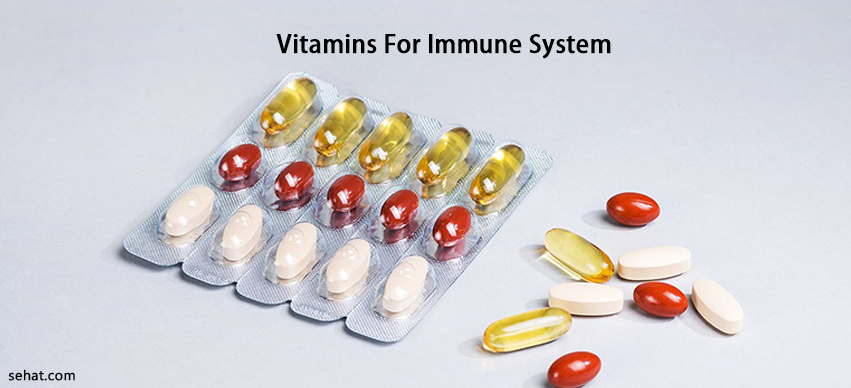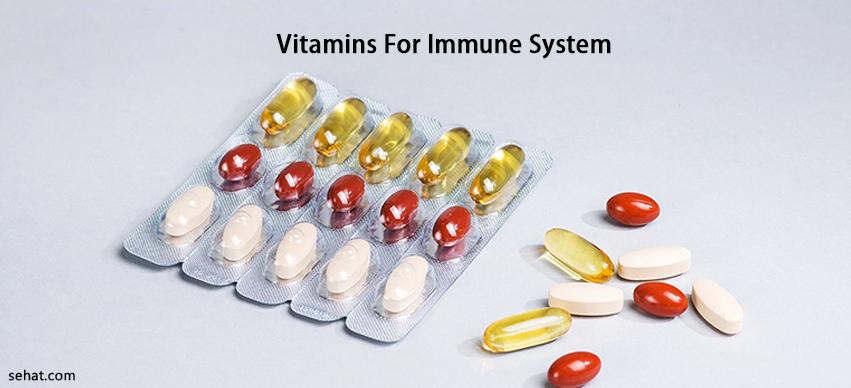How Communities Are Changing the Way We Think About Aging in..
8 Min Read


We have always been advised by our parents, nutritionists, dietitians, and doctors to “eat your rainbow". The reason behind asking us to follow the healthy diet and the so-called “food pyramidâ€, is to ensure that we receive maximum nutritive value out of the food that we eat.
Currently, the world is facing a crisis due to the outbreak of the Coronavirus (COVID-19) pandemic. People are being urged to follow basic hygiene practices and particularly stay at home to prevent contracting an infection and even spreading it. Special emphasis is also being laid upon the importance of foods and dietary inclusions that support and boost the immune system naturally.
During such difficult times, we must consider ourselves privileged enough to have access to the best possible foods. This article will give you a brief idea about the list of vitamins to boost your immune system so that you can include such foods in your daily diet.
The word vitamin can be split into two – “vital" “amines". As the same suggests, vitamins are naturally occurring complex, organic compounds necessary for the body in appropriate amounts to carry out biochemical activities within the body.
Vitamins are divided into two separate categories;
Vitamins play a significant role in promoting the growth and development of the body. Research has also proven that deficiency of vitamins is linked to certain illnesses.
Vitamins along with their important functions are mentioned in the table below;
| Sr. No | Vitamin | Function |
| 1. | Vitamin A ((Retinoids and Carotenoids) | Vision Supports the immune system and inflammatory mediators of cells Promotes cell growth and development Antioxidant activity |
| 2. | Vitamin D (Cholecalciferol) | Formation of bones It enhances calcium absorption from food and reduces the loss of calcium through urine. Maintains blood calcium levels Maturation of white blood cells to promote an immune response |
| 3. | Vitamin E (Tocopherols) | Maintains optimal levels of low-density lipoproteins Strong antioxidant Prevents oxidative damage to blood vessels due to free radicals |
| 4. | Vitamin K | Blood clotting function Promotes mineralization of bones and strengthens bones |
| 5. | Vitamin B1 (Thiamine) | Production of energy from the metabolism of fats and carbohydrates |
| 6. | Vitamin B2 (Riboflavin) | Essential for iron metabolism (for production of red blood cells) Recycles Glutathione (an essential antioxidant) |
| 7. | Vitamin B3 (Niacin) | Energy production by the metabolism of fats, proteins, and carbohydrates Strong antioxidant |
| 8. | Vitamin B5 (Pantothenic acid) | Energy production from fats, carbohydrates, and proteins. Supports the immune system |
| 9. | Vitamin B6 (Pyridoxine) | Carbohydrate metabolism Red blood cell production Detoxification of the liver Maintains the function of the brain and nervous system Production of neurotransmitters |
| 10. | Vitamin B9 (Folate) | Promotes brain health and cardiovascular health Regulates homocysteine levels in the blood Regulates blood pressure and prevents the clotting of blood within the circulation Important for red blood cell production |
| 11. | Vitamin B12 (Cobalamin) | Essential for cardiovascular health Promotes the production of red blood cells Regulates blood homocysteine levels Important cofactor for DNA synthesis Necessary for aerobic respiration of cells Promotes bone health |
| 12. | Biotin (Coenzyme R, vitamin H, Vitamin B7) | Metabolism of sugars and fats Promotes optimum skin health |
| 13. | Vitamin C (Ascorbic acid) | Antioxidant properties Protects the lens if the eyes Metabolism of various drugs Antiviral activity Production of collagen Synthesis of some neurotransmitters Necessary for the synthesis of serotonin – needed or proper functioning of the nervous system, endocrine system, digestive system, and immune system Serotonin is also essential for mood changes and experiences of pain and stress |
It is quite evident from the table above that our general health status and optimal functioning of the immune system depends upon an adequate intake of vitamins, which is directly related to the kind of diet that we follow and the type of food that we eat.
Best vitamins which support and boost the immune system are;
Vitamin A derived from animal sources is called retinoid and that from plant sources is called pro-vitamin A carotenoid. During digestion, provitamin A carotenoids are converted into preformed vitamin A retinoids.
This is the most easily yet inconsistently available vitamin. Exposure of skin for about 10 minutes to the sun converts 7-dehydrocholesterol into cholecalciferol (a preliminary form of Vitamin D). The amount of cholecalciferol produced depends upon the type of skin and skin health, nature of skin pigments and the nature of sunlight.
Since the 1980s, vitamin D deficiency has increased due to an increase in the use of sunscreens and reduced sun exposure due to a sedentary lifestyle.
Vitamin D deficiency is linked to several disorders such as lowered immune function, bronchial asthma, osteoporosis, rickets, diabetes mellitus, rheumatoid arthritis, depression, and epilepsy.
Eggs, salmon, cows milk, mushrooms, orange juice, and soy milk. Certain foods like milk, cheese, margarine, and oils are being fortified with Vitamin D to meet the daily recommended intake requirements.
Being a potent antioxidant, vitamin E supports the immune system by maintaining cellular functioning and preventing oxidative damage.
Vitamin E deficiency is linked to increased risk of cancer, stroke, cardiovascular diseases, epilepsy, diabetes mellitus, cataract, Alzheimer's disease, and poor immune status.
Spinach, asparagus, broccoli, bell peppers, kale, avocado, tomatoes, peanuts, olives, carrots, green beans, kiwi, cranberries and raspberries.
This group of vitamins consists of nicotinamide and nicotinic acid. This vitamin eradicates free radicals and protects the tissues against oxidative damage.
Vitamin B3 deficiency is associated with alcohol and illnesses such as pellagra, osteoarthritis, acne vulgaris, schizophrenia, high cholesterol, and type-1 diabetes.
Mushrooms, chicken, bell peppers, tomatoes, sweet potatoes, sunflower seeds, brown rice, green peas, carrots, potatoes, spinach, broccoli, cabbage, cauliflower, eggplant, beetroot
This vitamin supports the immune system as it influences red blood cell production and also helps in detoxifying the liver. It is a co-factor for different enzymes that carry out basic functions in the body.
Vitamin B6 deficiency is linked to some major diseases like several chronic inflammatory diseases, epilepsy, attention deficit disorder, anemia, premenstrual syndrome, high homocysteine levels, and even depression.
Garlic, cabbage, spinach, bell peppers, cauliflower, chicken, broccoli, bananas, sprouts, tomatoes, leeks, green peas, avocados, lentils, turmeric, pineapple, mushrooms, corn, celery, watermelon, strawberries, and fortified cereals.
Plays a critical role in boosting the immune system by virtue of its different functions mentioned in the table above.
Folate deficiency is linked to an increased risk of cardiovascular disease, neural tube defects in infants, loss of pregnancy or miscarriage, high risk of cancer, hypertension, anemia, ulcerative colitis, psoriasis, decline in cognitive functions and osteoporosis.
Spinach, avocado, lettuce, kidney beans, rice, eggs, peanuts, and salmon.
The daily requirement of vitamin B12 is very minute. It can only be synthesized by microorganisms like fungi – mushrooms. The deficiency of vitamin B12 is quite common as it is difficult to absorb by the body.
Vitamin B12 deficiency is associated with impaired brain health, anemia, osteoporosis, neuropathy, migraine, fatigue, asthma, memory loss, gastritis, Alzheimer's disease, kidney disorders, and multiple sclerosis.
Seafood, eggs, cheese, mushrooms, cows milk, chicken and fortified breakfast cereals.
The first nutrient that comes into mind when we speak of immunity is vitamin C. It is found in every tissue of the body except the central nervous system.
Vitamin C boosts immunity against colds, influenzas, and infections by;
Vitamin C deficiency is linked to the suppressed immune system, weak collagen formation, delayed wound healing and increased susceptibility to infections.
Orange, lemon, tomatoes, cabbage, bell peppers, and green peas.
Adequate intake of vitamins to boost the immune system are also mandatory for maintaining overall health. All the important vitamins for the immune system can be easily obtained from fruits, vegetables, nuts, seeds, grains, and cereals.
Vitamins aid the body to fight against infections and protect the cells against damage. These vitamins also promote, enhance and regulate the immune system. The vitamins mentioned above are also frequently available in the form of supplements by prescription from a qualified medical practitioner.